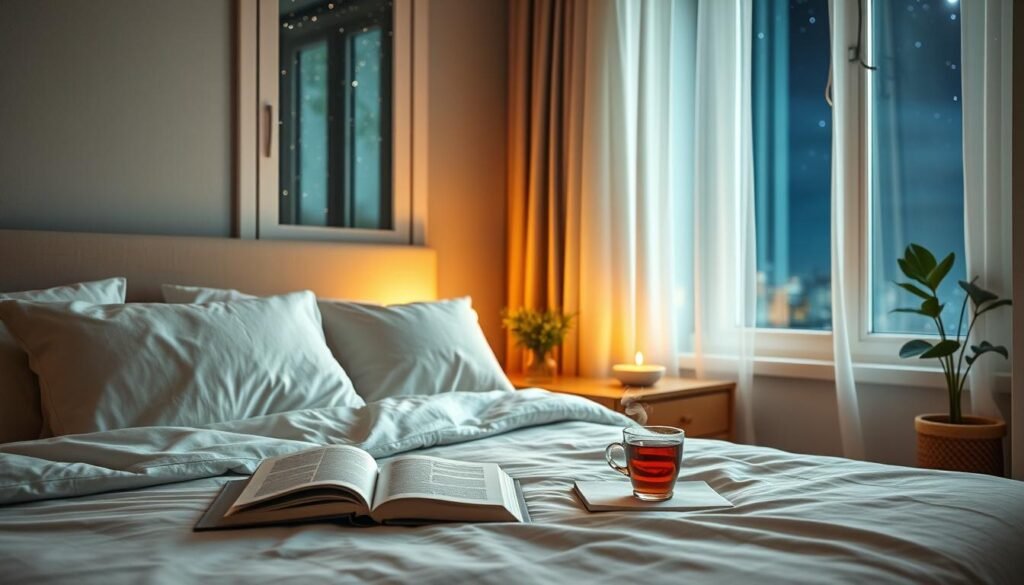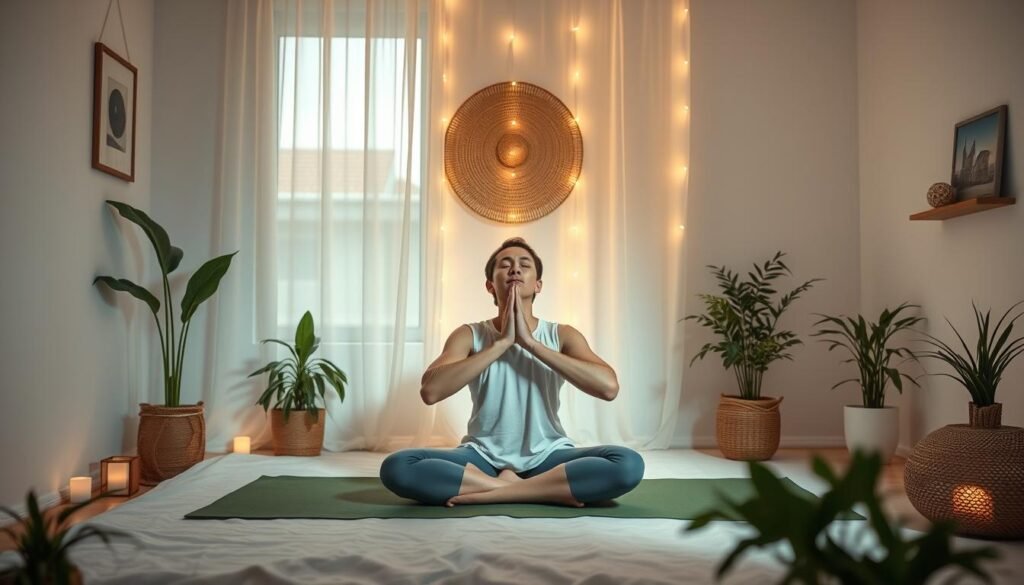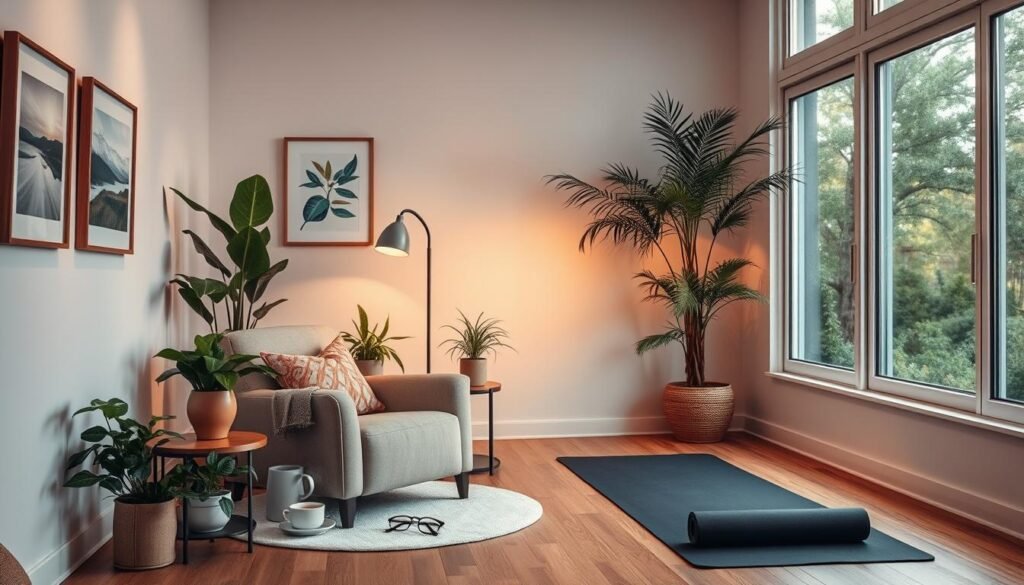Did you know about 40 million adults in the US struggle with anxiety disorders? This makes sleep anxiety a big problem for many. It affects how well you can sleep and can make other mental health issues worse, like anxiety disorder and insomnia. Luckily, there are coping techniques for sleep anxiety you can start tonight. They help you sleep better and improve your sleep hygiene.
To deal with sleep anxiety, combine anxiety management strategies. These include having a regular sleep schedule, practicing relaxation techniques, and making your bedroom cozy. We’ll explore various tactics to manage sleep anxiety. They’ll help you get a more peaceful sleep.
Key Takeaways
- Anxiety disorders impact millions, making sleep anxiety a common concern.
- Implementing coping techniques can enhance sleep quality and hygiene.
- Establishing a consistent sleep routine helps regulate the body’s internal clock.
- Relaxation strategies can effectively alleviate feelings of anxiety before bedtime.
- Creating a comfortable sleep environment is crucial for tackling sleep anxiety.
Understanding Sleep Anxiety
Sleep anxiety is a big problem for many people. It is closely linked with anxiety disorders. This issue involves constant worry about sleeping, making other mental health problems worse. People with sleep anxiety often find it hard to stay asleep all night.
Several factors can cause sleep anxiety. It’s vital to understand how it affects our health. Not eating right and skipping workouts can impact sleep quality. Avoiding caffeine before bed helps people sleep better. Likewise, drinking alcohol can mess up how long and well you sleep.
Insomnia and other health issues like anxiety and depression are connected. Not getting enough sleep can make anxiety worse. It also raises the chance of getting diseases like heart problems and diabetes. This shows how important a good night’s sleep is for our health.
Cognitive behavioral therapy (CBT) is a great way to treat sleep problems caused by anxiety. It usually starts with visits to a sleep expert. Sticking with CBT can significantly improve sleep over time. This offers much hope to those dealing with sleep anxiety.
Why Sleep Anxiety Increases at Night
At night, sleep anxiety often gets worse. This is mainly because there are fewer distractions. When the sun goes down, we stop our daily tasks. This lets stressful thoughts come to the front of our minds. These thoughts can keep us awake, worrying and stressed.
Our brain’s fear center, the amygdala, reacts more in silence. It sees dangers that aren’t there. Concerns about the future become the main focus, making us feel scared. A big 20% of adults in the US deal with anxiety disorders. This shows it’s a common problem at night.
Some symptoms of nighttime anxiety are feeling restless, having a fast heartbeat, and fearing something bad will happen. About 43% of adults say anxiety messes up their daily routine. This shows that these nagging thoughts can ruin both our day and our sleep at night.
This problem can become a loop: bad sleep makes daytime anxiety worse, which then makes the next night even harder. Many feel extreme worry as bedtime gets closer. This struggle can make it hard to relax and sleep well.
To fix sleep problems, we need to understand the link to nighttime anxiety. The table below shows common symptoms and causes. It helps in recognizing and dealing with these issues.
| Symptoms of Nighttime Anxiety | Potential Causes |
|---|---|
| Intrusive thoughts | Lack of daytime distractions |
| Increased heart rate | Overactive amygdala response |
| Restlessness | Heightened stress reaction |
| Dizziness | Sleep deprivation effects |
| Tense muscles | Psychological distress |
Recognizing Symptoms of Sleep Anxiety
Understanding the symptoms of sleep anxiety can greatly help people. Many face signs like racing thoughts and a fast heart rate. These signs can be worrying and lead to too much stress over simple choices.
People with sleep anxiety often have trouble with:
- Difficulty falling asleep
- Frequent awakenings during the night
- Waking up early and feeling unrefreshed
- Muscle tension and palpitations
- Restlessness and inability to relax
These symptoms can really impact one’s mental health and everyday life. Spotting common signs such as feeling more tense or having a hard time focusing at night is key to better sleep. It’s important to become aware of mental health. Not dealing with symptoms of sleep anxiety can lead to bigger problems like insomnia or depression.
| Symptom Category | Physical Symptoms | Mental Symptoms | Behavioral Symptoms |
|---|---|---|---|
| Common Symptoms | Increased heart rate, muscle tension | Racing thoughts, feeling tense | Avoiding bedtime, excessive daytime sleepiness |
| Sleep Impact | Difficulties in falling or staying asleep | Inability to concentrate | Reliance on sleeping aids |
Being aware of these symptoms and their causes lets people work towards better sleep. If you face these challenges, getting the right support is crucial.
Coping Techniques for Sleep Anxiety
Many people struggle with sleep anxiety. A survey shows that 44% of adults had stress-related sleep issues last month. Using effective methods can help reduce these symptoms and lead to better sleep. Here are some helpful strategies.
Deep Breathing Exercises
Deep breathing is a great way to relax your mind and body. It makes you feel less stressed. Doing gentle breathing exercises daily for 20 to 25 minutes can really help. After doing this for two weeks, you might start feeling better emotionally and physically.
Visualization Techniques
Visualization helps create a peaceful state of mind. By imagining peaceful places or happy times, you can escape anxious thoughts that keep you awake. Adding mindfulness makes this even more powerful. It helps your mind stay on peaceful thoughts instead of worrying.
Progressive Muscle Relaxation
Progressive muscle relaxation is good for easing tension. You tense and release different muscles in turn. It’s especially good if you can’t sleep well. Combining this with other relaxation methods can be very effective. It helps calm your body and mind, improving your sleep.

Building Healthy Sleep Hygiene
Good sleep hygiene is key to better sleep and less sleep anxiety. By having a regular sleep schedule, you can fall asleep and stay asleep easier. Going to bed and waking up at the same time helps your body know when it’s time to rest. This leads to a more peaceful sleep.
Creating a Consistent Sleep Schedule
It’s important to go to bed and wake up at the same times every day. This helps your body’s internal clock stay regular. Good habits greatly improve how well you sleep and your overall health. With a set schedule, your body gets ready for sleep more easily.
Limiting Screen Time Before Bed
Cutting down on screen time before bed improves your sleep. The blue light from screens makes falling asleep harder. Doing calm activities like reading or meditating helps your body prepare for sleep. Plus, your bedroom should be dark, cool, and quiet to help you sleep without interruptions. This helps your bedtime routine and boosts your sleep hygiene.
The Role of Cognitive Behavioral Therapy
Cognitive Behavioral Therapy (CBT) is well-known for treating various anxiety disorders, including sleep anxiety. It’s a structured program that lasts 6 to 8 sessions. It aims to change negative thoughts and promote positive behaviors to manage anxiety better.
CBT for insomnia (CBT-I) is very helpful for those who have trouble sleeping. About 70-80% of people with primary insomnia see big improvements. CBT-I works on many fronts like sleep restriction and improving sleep habits, making it a top recommendation.
A 2015 study found that CBT-I reduced the time to fall asleep by 19 minutes and increased sleep efficiency by 10%. This shows that CBT-I can be as effective as sleep medications but without their side effects. It offers a safer option for the long run.
The American College of Physicians supports CBT-I for treating insomnia. Despite the popularity of sleep meds, CBT-I, which includes mindfulness and muscle relaxation, might be a better choice. It’s recognized and respected by doctors.
However, finding qualified therapists for behavioral sleep medicine in the U.S. is hard. Knowing more about CBT’s benefits could help people with sleep anxiety and improve mental health.
In summary, CBT is a potent way to deal with sleep anxiety. It doesn’t just reduce symptoms but also teaches valuable strategies to improve sleep and well-being. For detailed info on CBT-I, check out this resource.
Mindfulness Meditation for Anxiety Management
Mindfulness meditation is a strong method for managing anxiety. It helps people live in the moment and accept their thoughts calmly. This technique is especially helpful at night, when anxiety can get worse.
Studies show mindfulness really works to lessen anxiety. One research in the American Journal of Psychiatry showed Mindfulness-Based Stress Reduction (MBSR) helps reduce anxiety and panic. A 2014 analysis in JAMA Internal Medicine also found mindfulness can lower anxiety and depression levels.
Using guided meditations and deep breathing can help people deal with anxiety’s root causes. These exercises help us stay present and respond to stress with awareness. They also trigger the body’s relaxation mode, help manage stress, and improve sleep, which is great for those with insomnia.
Being mindful also boosts resilience and emotional control. Just ten minutes of practice can greatly enhance focus and job performance in anxious folks. Consistent mindfulness can cut down on constant worries, especially those affecting sleep.
Adding mindfulness meditation to your nightly routine can help relax you, ease anxiety, and improve sleep. Over time, these habits build a strong base for handling anxiety well.
| Study/Source | Findings |
|---|---|
| American Journal of Psychiatry (1992) | MBSR effectively reduces anxiety and panic symptoms. |
| JAMA Internal Medicine (2014) | Mindfulness programs show small to moderate anxiety and depression reductions. |
| The Journal of Consulting and Clinical Psychology (2000, 2008) | MBCT reduces depression relapse rates by 50%. |
| The Lancet (2015) | Combination of medication tapering and MBCT is equally effective as continuous dosage. |
| University of Waterloo Study | Ten minutes of mindfulness improves focus in anxious individuals. |
Incorporating Relaxation Exercises into Your Routine
Adding relaxation exercises to your daily schedule can help improve your sleep. Many adults suffer from chronic insomnia due to stress and anxiety. These feelings activate the body’s stress response, making it hard to sleep. To tackle this, trying out different relaxation techniques is key.
Breathing exercises, like diaphragmatic breathing, lower stress and help you relax. This can lead to better sleep. Another method, progressive muscle relaxation, focuses on tensing and then relaxing your muscles. This helps ease tension before sleep. For best results, do these exercises regularly.
Non-sleep deep rest (NSDR) is also a useful technique. It puts you in a state similar to just before sleep, which refreshes the mind and could improve memory. Trying different relaxation techniques can help find what works best for you.
For these techniques to work best, having a good sleep setting is crucial. A room that’s quiet, dark, and cool helps avoid sleep disruptions. Also important are keeping a regular sleep schedule and adopting habits that encourage sleep.
Here are some popular relaxation techniques for daily practice:
| Technique | Description | Benefits |
|---|---|---|
| Deep Breathing | Focus on slow, deep breaths to calm the mind. | Reduces anxiety and promotes relaxation. |
| Progressive Muscle Relaxation | Tense and relax muscle groups to relieve tension. | Improves sleep quality and reduces stress. |
| Yoga | Gentle stretches and postures for relaxation. | Enhances sleep quality and decreases nighttime awakenings. |
| Visualization | Imagining calming scenes to promote relaxation. | Helps to counter racing thoughts at bedtime. |
| Journaling | Documenting thoughts and feelings before bed. | Reduces stress and aids emotional processing. |
Eating a balanced diet and avoiding stimulants like caffeine before bed can also help improve your sleep. Using relaxation exercises regularly is a strong approach to reduce sleep anxiety and enjoy restful nights. For more help with sleep problems, check out this resource.

Sleep Medication Alternatives
Many people with sleep anxiety look for effective treatments. This includes different sleep medications. However, these medications can have side effects. So, exploring natural alternatives like herbal teas, essential oils, and melatonin supplements is a good idea. These options help avoid the side effects of drugs.
Common natural aids such as chamomile tea and valerian root are calming. They can help you fall asleep easier. These natural remedies are also good for managing anxiety. This can lead to a better night’s sleep without the side effects some drugs have.
It is crucial to talk to a healthcare provider before trying any sleep aid. This ensures it’s safe and effective for you. Things like your age, health, and current sleep habits affect how well these aids work. To get the best results, consider combining these alternatives with changes to your lifestyle.
The table below lists different sleep medication alternatives. It covers their benefits and important considerations:
| Alternative Methods | Type | Benefits | Considerations |
|---|---|---|---|
| Chamomile Tea | Herbal | Promotes relaxation, mild sedative effects | May cause allergic reactions in some |
| Melatonin Supplements | Supplement | Helps regulate sleep-wake cycles | Long-term safety unclear; consult a doctor |
| Valerian Root | Herbal | Improves sleep quality | Effects may vary; not suitable for everyone |
| Essential Oils (Lavender) | Therapeutic | Calming aroma; promotes relaxation | Limited scientific studies; may be less effective for severe anxiety |
| Yoga and Meditation | Mind-Body Techniques | Reduces stress, improves sleep hygiene | Requires practice; benefits may take time to notice |
Looking into these alternatives can help with sleep anxiety and boost well-being. For more info on treating insomnia, visit Mayo Clinic and Mood Care Health.
Stress Reduction Techniques to Implement Daily
Introducing stress reduction techniques into daily life can greatly improve mental health. This leads to better sleep. Stress often causes sleep issues, hurting overall health. By practicing relaxation daily through yoga, meditation, and deep breathing, a sense of peace is achieved. This peace is key in handling stress.

Studies have shown that meditation helps in reducing sleep problems. This results in deeper, healing sleep. Also, regular exercise reduces stress. It has been found to help sleep, especially for those with anxiety. For the best effect, exercise should be done two hours before bed to help relax.
Progressive relaxation helps reduce stress by easing physical tension. It’s done by tensing and then relaxing muscles throughout the body. This promotes deep relaxation. Eating well also reduces stress. Foods low in sugar, caffeine, and alcohol aid in managing stress and improving sleep.
- Practice mindfulness meditation.
- Engage in yoga sessions.
- Implement deep breathing exercises.
- Establish a consistent sleep schedule.
- Seek social support from friends and family.
Managing thoughts can alter stress-inducing thinking, which boosts emotional health. Sharing tasks also reduces the feeling of being overwhelmed. This allows for more self-care time. By applying these stress reduction strategies, one can achieve daily relaxation and build better sleep routines for a healthier life.
Finding Professional Help for Sleep Anxiety
If you’re facing sleep anxiety, it’s important to seek professional help. Qualified therapists can greatly improve your anxiety and sleep. They help by talking through your fears, which can make things more manageable.
Cognitive Behavioral Therapy for Insomnia (CBT-I) is highly effective for sleep troubles. It targets both your sleep issues and the anxiety causing them. Studies show that CBT-I helps people by changing their negative thoughts and actions about sleep.
To recover, finding a good therapist is key. They’ll have the right tools to help you beat sleep anxiety. You’ll have different therapy types to choose from, including CBT-I and more.
- Cognitive Behavioral Therapy for Insomnia (CBT-I)
- Mindfulness-based therapies
- Psychotherapy focusing on anxiety reduction
Besides therapy, making lifestyle changes is helpful. For instance, exercising can improve your sleep by increasing melatonin. Regular physical activity leads to deeper and longer sleep. So, professional help mixed with lifestyle changes can ensure peaceful nights.
Conclusion
Sleep anxiety can really affect your mental and physical health. This article talked about ways to help manage it. Techniques like deep breathing, visualization, and mindfulness can help you sleep better.
Using problem-focused strategies can make it easier to handle sleep issues. These methods can lead to more sleep and less depression. It’s also key to have good sleep habits. This means sleeping at the same time every night and not using screens before bed. These steps can make your sleep environment better.
If you’re dealing with sleep anxiety, it’s important to take steps to feel better. Try the strategies we discussed and think about getting professional help if you need it. With effort and the right methods, peaceful sleep is possible.